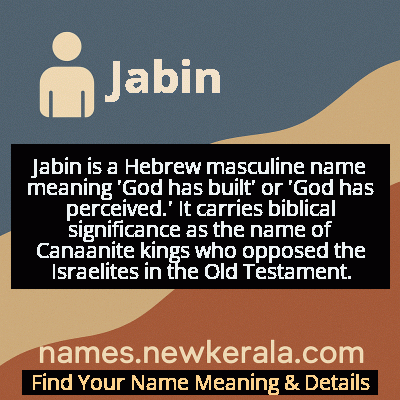Jabin Name Meaning & Details
Origin, Popularity, Numerology Analysis & Name Meaning of Jabin
Discover the origin, meaning, and cultural significance of the name JABIN. Delve into its historical roots and explore the lasting impact it has had on communities and traditions.
Name
Jabin
Gender
Male
Origin
Hebrew
Lucky Number
9
Meaning of the Name - Jabin
Jabin is a Hebrew masculine name meaning 'God has built' or 'God has perceived.' It carries biblical significance as the name of Canaanite kings who opposed the Israelites in the Old Testament.
Jabin - Complete Numerology Analysis
Your Numerology Number
Based on Pythagorean Numerology System
Ruling Planet
Mars
Positive Nature
Generous, passionate, energetic, and humanitarian.
Negative Traits
Impulsive, impatient, moody, and can be overly emotional.
Lucky Colours
Red, maroon, scarlet.
Lucky Days
Tuesday.
Lucky Stones
Red coral, garnet.
Harmony Numbers
1, 2, 3, 6.
Best Suited Professions
Military, sports, philanthropy, leadership roles.
What People Like About You
Courage, energy, leadership, generosity.
Famous People Named Jabin
Jabin of Hazor
Biblical King
Canaanite king defeated by Joshua as recorded in Joshua 11:1-14
Jabin II
Biblical King
Canaanite king who oppressed Israel for 20 years before being defeated by Deborah and Barak
Jabin T. S. R.
Modern Scholar
Academic researcher in biblical studies and ancient Near Eastern history
Name Variations & International Equivalents
Click on blue names to explore their detailed meanings. Gray names with will be available soon.
Cultural & Historical Significance
The name's meaning 'God has built' or 'God has perceived' reflects the Hebrew understanding of divine providence and construction of history, making it a name that carries deep religious significance within Judeo-Christian traditions. Beyond its biblical context, the name represents the complex relationship between power, faith, and historical progression, serving as a reminder that even formidable opposition can be overcome through divine guidance and collective action.
Extended Personality Analysis
Individuals named Jabin are often perceived as strong-willed, determined, and possessing natural leadership qualities, reflecting the powerful biblical kings who bore this name. They tend to be strategic thinkers with a capacity for organization and planning, though they may sometimes exhibit stubbornness or resistance to change. The name suggests someone who builds foundations - whether in relationships, career, or personal projects - and who approaches life with a sense of purpose and construction.
While they can be formidable when challenged, those named Jabin often develop wisdom through experience and learn to balance their natural authority with compassion and understanding. Their personality typically combines practical intelligence with deep conviction, making them effective in positions requiring both vision and execution. The biblical association also suggests that individuals with this name may undergo significant personal transformations, learning to channel their strong will toward constructive rather than oppositional purposes as they mature.
Modern Usage & Popularity
In contemporary times, Jabin remains a relatively uncommon but meaningful choice, primarily among families with strong biblical or Hebrew heritage. The name has maintained steady but low usage in English-speaking countries, often selected by parents seeking a distinctive biblical name that isn't overly common. Its usage peaked slightly in the late 20th century during renewed interest in Old Testament names but remains outside the top 1000 names in most Western countries. Modern usage reflects a preference for names with historical depth and spiritual significance without being overly popular, appealing particularly to parents who value both tradition and individuality in name selection.
Symbolic & Spiritual Meanings
Symbolically, Jabin represents construction, divine perception, and the building of foundations. The name carries connotations of strength, resilience, and the ability to overcome opposition through strategic thinking and faith. It symbolizes the tension between human authority and divine will, serving as a reminder that even powerful structures and rulers are subject to higher principles. Metaphorically, Jabin suggests someone who builds lasting legacies, perceives deeper truths, and understands that true strength comes from alignment with purposeful construction rather than mere power. The name embodies the concept that what is built with divine insight endures, while opposition to higher purposes ultimately fails.

